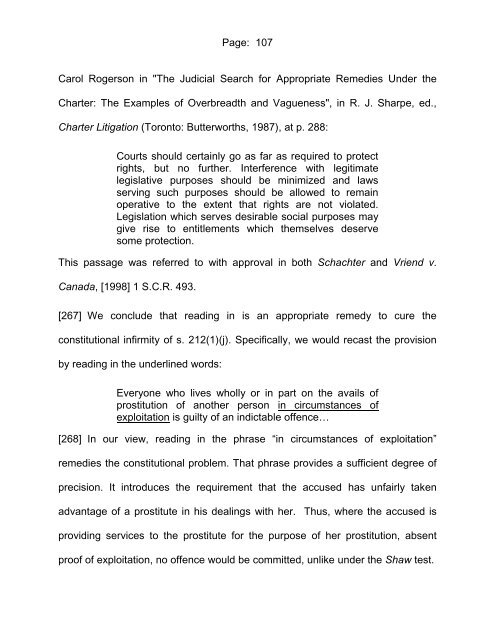Canada (Attorney General) v. Bedford, 2012 ONCA ... - York University
Canada (Attorney General) v. Bedford, 2012 ONCA ... - York University
Canada (Attorney General) v. Bedford, 2012 ONCA ... - York University
Create successful ePaper yourself
Turn your PDF publications into a flip-book with our unique Google optimized e-Paper software.
Page: 107Carol Rogerson in "The Judicial Search for Appropriate Remedies Under theCharter: The Examples of Overbreadth and Vagueness", in R. J. Sharpe, ed.,Charter Litigation (Toronto: Butterworths, 1987), at p. 288:Courts should certainly go as far as required to protectrights, but no further. Interference with legitimatelegislative purposes should be minimized and lawsserving such purposes should be allowed to remainoperative to the extent that rights are not violated.Legislation which serves desirable social purposes maygive rise to entitlements which themselves deservesome protection.This passage was referred to with approval in both Schachter and Vriend v.<strong>Canada</strong>, [1998] 1 S.C.R. 493.[267] We conclude that reading in is an appropriate remedy to cure theconstitutional infirmity of s. 212(1)(j). Specifically, we would recast the provisionby reading in the underlined words:Everyone who lives wholly or in part on the avails ofprostitution of another person in circumstances ofexploitation is guilty of an indictable offence…[268] In our view, reading in the phrase “in circumstances of exploitation”remedies the constitutional problem. That phrase provides a sufficient degree ofprecision. It introduces the requirement that the accused has unfairly takenadvantage of a prostitute in his dealings with her. Thus, where the accused isproviding services to the prostitute for the purpose of her prostitution, absentproof of exploitation, no offence would be committed, unlike under the Shaw test.
















